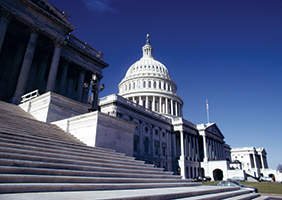Newsroom
NAFCU urges Senate to support PPP changes
 After reaching a bipartisan agreement last week on legislation to extend some provisions of the Small Business Administration's (SBA) paycheck protection program (PPP), NAFCU Vice President of Legislative Affairs Brad Thaler wrote Senate leadership urging the chamber "to clear the measure in timely fashion."
After reaching a bipartisan agreement last week on legislation to extend some provisions of the Small Business Administration's (SBA) paycheck protection program (PPP), NAFCU Vice President of Legislative Affairs Brad Thaler wrote Senate leadership urging the chamber "to clear the measure in timely fashion."
"The bipartisan efforts in S. 3833 to extend the 8-week period to use PPP loans and modify the terms of what the loans can be used for will provide important relief to small businesses," Thaler wrote. "Due to various state guidelines regarding the closure of non-essential businesses, many PPP borrowers have not been able to exhaust PPP funds in the given covered period, potentially affecting their ability to have their PPP loans forgiven. In addition to the economic hardship small businesses have faced and the uncertainty of their future viability, they remain concerned that they will be saddled with an outstanding loan balance without an extension of the covered period."
Thaler also noted the importance of the "hold harmless" clarifications included in the bill for lenders, and called on the Senate to continue to support the PPP with both funding and improvements as needed.
S. 3833 – the Paycheck Protection Program Extension Act – was introduced by Sens. Marco Rubio, R-Fla., Ben Cardin, D-Md., Susan Collins, R-Maine, and Jeanne Shaheen, D-N.H. The Senate began the process of hotlining the legislation Thursday, but was unable to advance it before adjourning for the Memorial Day holiday. The chamber could clear the measure by unanimous consent during a pro-forma session this week, or take a recorded vote on the legislation when it returns next week.
In addition to extending to loan period, the bill would extend the PPP's authorization from June 30 to Dec. 31, 2020. It would also allow PPP funds to be used to purchase personal protective equipment for employees and pay for adaptive investments needed to reopen safely. It also includes a NAFCU-sought provision to clarify the lender "hold harmless" provision to ensure lenders are not held liable for:
- the borrower certification and documentation they provide when applying for a PPP loan and subsequent forgiveness; and
- following previously released guidance from the SBA and Treasury if guidance had subsequently changed.
Prior to the bipartisan agreement on the Senate bill, the House had indicated it would consider its own bipartisan plan next week to ease restrictions on how businesses use the PPP. That proposed legislation would reportedly give businesses 24 weeks to spend the money from the program and would eliminate a requirement that at least 75 percent of the PPP loan forgivable amount must be used toward payroll. The House could advance its proposal this week.
The House-passed HEROES Act also aims to make changes to the PPP.
NAFCU will continue to monitor potential changes to the PPP and remain in contact with the SBA, Treasury Department, and Congress to ensure credit unions can lend effectively through the program. Of note, in the past week the SBA has released additional information in NAFCU-sought areas, including loan forgiveness and 1502 reporting.
Access NAFCU's PPP FAQs here; more information is also available on the SBA's and Treasury's websites.
Share This
Related Resources
The Ride-Share Conundrum: An Exception to an Exception
Business Lending
Blog Post
Taking Care of Business: Recent Developments in Commercial Lending
Business Lending
Blog Post
Marijuana Banking Issue Brief
Whitepapers
Loan Maturity Issue Brief
Whitepapers
Get daily updates.
Subscribe to NAFCU today.
